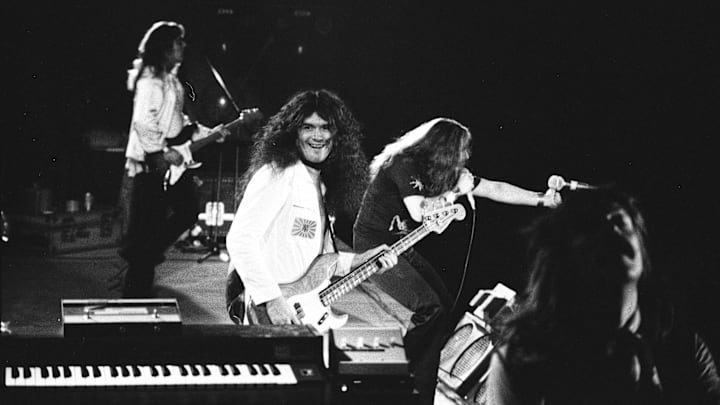The 1970s music scene covered many types and genres. Especially as the decade rolled on and we saw the likes of punk rock and new wave shake things up significantly. Whatever your preferences and taste from all that, there’s little doubt that the 1970s were prime time for classic rock bands.
There were so many huge bands at the time making great music and becoming legends. That music and those rock artists were largely focused on making albums and touring, which left many open to a surprise flaw at the time. Did that make them slightly less than perfect, though?
The albums were often huge sellers and are still loved today. The live performances were at times iconic and legendary. The number of people who have since claimed to have been at one of the top gigs probably far exceeds the actual audience levels.
1970s classic rock bands adapt but develop a flaw
Stadium and arena rock shows were settling in, bands were making more complex and longer songs to perform, and we also saw AOR, album-oriented rock, emerge.
Radio stations started to switch to playing deep cuts from the albums, and long tracks were no longer shunned. FM radio took over and continued those themes. Many of the top classic rock bands were very happy to make albums and play live, and also less keen to chase the hit single market. Avoiding the hit parade kept their reputation sound as serious musicians.
While some bands did decide to release singles and aim for hits to boost their success, it certainly wasn't the case for all. Many of the top 1970s classic rock bands had surprisingly few hit singles as a result.
That's despite having many, many great tunes they could have used. Let's have a look at eight classic rock greats that had what could be described as a flaw on their CV when it comes to hit singles.
Led Zeppelin
A powerhouse of the 1970s, and of course the late 1960s. It was all very much based on albums and live performances. The band didn't aim for the singles market and the majority of their best-known songs weren't released individually. Of their few singles, “Whole Lotta Love” was their biggest hit reaching US number 4 in 1970.
Pink Floyd
Another band that’s as huge as they come. Their album sales exceed 250 million worldwide. The band did release just under thirty singles over the years, but with minimal chart impact. In the late 1960s, “Arnold Layne” and “See Emily Play” were minor UK hits. Oddly enough, their biggest-selling single was a Christmas number one, “Another Brick in the Wall (Part II)” in 1980.
Grateful Dead
Sometimes, the style and complexity of the music pretty much ruled out hit singles. That was the case with the Grateful Dead, totally suited to long jamming sessions on stage, less so the singles chart. The band did get radio play, but on FM and more specialist stations. Nevertheless, they did have a US top ten hit with “Touch of Grey” in 1987.
Yes
Another example of the musical complexity and intricacies ruling out the mainstream radio airtime and single hits. Individual members like Jon Anderson and Rick Wakeman had single successes, Anderson in his own right or with Vangelis for example.
Or Wakeman playing on many other artists’ hit songs, David Bowie’s “Space Oddity” or “Life On Mars.” As Yes, though, their hit single success was limited to “Roundabout” in 1972, peaking at number 13 in the US.
Allman Brothers Band
The 1970s were an astounding decade for live albums. In any list of the best of those recorded performances, the Allman Brothers and At Fillmore East will most likely feature. And rightly so, it captures the terrific live essence of the band superbly. Once again, though, that sound, those shows, and some great albums didn't cut through to hit singles.
Just the one big hit in that way with “Ramblin’ Man” at number 2 in 1973. The follow-up, “Jessica,” is a superb song with lots of airplay even now, but didn't get further than number 65. A few years later, in 1979, “Crazy Love” broke into the top thirty.
Deep Purple
An absolute classic amongst the 1970s rock bands. Deep Purple toured heavily, released great albums, and had memorable songs. Perhaps in this case, it's appropriate that their best-known song was also one of their few to make it high in the singles charts. “Smoke on the Water” reached number 4 back in 1973 with a live version of the song.
The band's debut single “Hush” also reached the same position a few years before, in 1968. Other songs like “Black Night” charted elsewhere, number 2 in the UK, for example, but the two above were their only US top 30 singles.
Frank Zappa / The Mothers of Invention
It’s probably less unusual that Frank Zappa and his band didn't have a crop of hit singles. The music was less mainstream and more of a cult following. Maybe the real surprise is that Zappa's style did make it to a singles chart entry in the Top 40. That came with his daughter Moon Unit with “Valley Girl” in 1982.
Jethro Tull
Another more unusual band and sound. The prog rock mix of folkier tunes and heavy rock came together well for top-selling albums. Success from singles, much less so. The band's one big hit came in 1973 with “Living in the Past” which rose to number 11 in the US singles chart.
